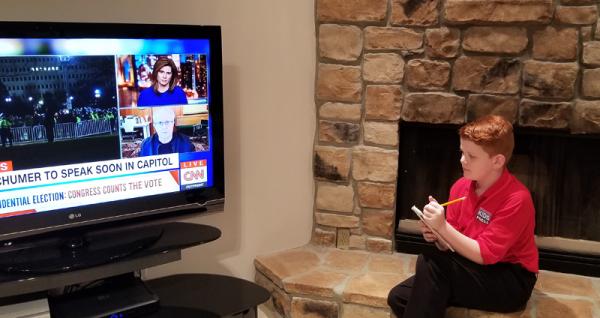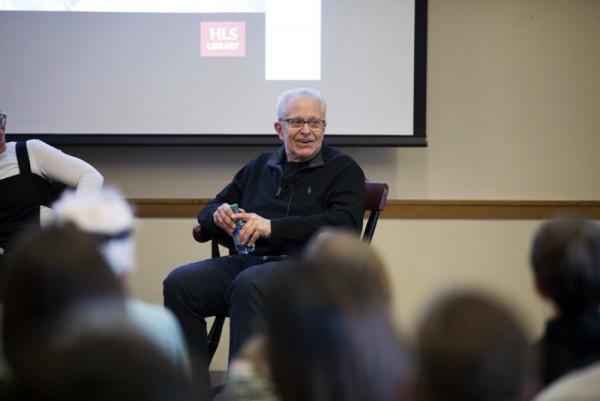KID REPORTERS’ NOTEBOOK
After the Capitol Riot, Trump is Impeached Again


On January 6, rioters stormed into the U.S. Capitol building, which is shown beyond the Washington Monument.
On January 6, hundreds of rioters stormed the United States Capitol building in Washington, D.C. Their goal was to disrupt the official counting of electoral votes cast in the 2020 presidential race.
Donald J. Trump, the current President, lost his bid for re-election to Joseph R. Biden, his Democratic challenger. Biden won 306 electoral votes, while Trump earned 232.
A few hours before the violence at the Capitol, President Trump held a rally for his supporters near the White House. As he has done for several months, he falsely claimed that the election had been “stolen” from him. State and local officials from around the country, as well as officials in the Trump Administration, have found Trump’s claims to be without merit. Of the 62 cases he brought in court, 61 failed.
Nonetheless, Trump refused to back away from his allegations. “When you catch somebody in a fraud, you are allowed to go by very different rules,” he said at the rally. “You have to show strength, and you have to be strong.”
Trump criticized lawmakers who did not support his claims and urged supporters to go to the U.S. Capitol, where the electoral vote count was taking place. Hundreds of followers headed to the domed building, pushing their way past police officers on the steps outside.
The rioters smashed windows, assaulted officers with fire extinguishers and pipes, and ransacked the offices of U.S. Senators and Representatives. Five people died as a result of the violence, including two police officers. Several others were injured.
“INCITEMENT OF INSURRECTION”
That evening, members of Congress who had fled to safety at the Capitol met again. There, they finished counting the electoral ballots, which affirmed Biden’s victory.
“To those who wreaked havoc in our Capitol today, you did not win,” said Vice President Mike Pence, who presides over the Senate. “Violence never wins. Freedom wins. And this is still the people's house.” Pence had been a target of the violent mob.
Democratic leaders in the House of Representatives and Senate then called for President Trump’s resignation. They said that he had provoked an attempted overthrow of the government.
When Trump refused to resign, impeachment proceedings were started. On January 13, the House voted to impeach the president for “incitement of insurrection,” which is an uprising against the government. All of the 222 Democrats and 10 Republicans voted in favor of impeachment. The President was impeached a year ago, so this was his second impeachment.
The Senate will now decide whether to convict the President of the insurrection charge. He also may face charges in criminal court.

Lincoln watches Laurence Tribe, a constitutional law scholar, to learn more about the events at the Capitol.
ENSURING A PEACEFUL TRANSFER OF POWER
To gain a better understanding of the guidance the Constitution offers, I emailed Laurence Tribe, a renowned lawyer and scholar who specializes in the Constitution. Tribe is the Carl M. Loeb University Professor and Professor of Constitutional Law Emeritus at Harvard Law School. He helped write the constitutions of South Africa, the Czech Republic, and the Marshall Islands and is currently advising Democratic leaders in Congress about the impeachment hearings.
Here are Tribe’s emailed responses, which have been edited for length and clarity.
What is the main thing you’d like kids to understand about the chaos at the Capitol?
The chaos they witnessed isn’t the way things are supposed to be, and it isn’t the way things are likely to remain. Lots of first responders stepped up to their responsibilities, saved lives, and protected people from injury. If we all care more for our neighbors and try to remember that there are ways of disagreeing, while still respecting those who have strong feelings the other way, things will get better.
When the transfer of power is not peaceful, what guidance does the Constitution provide?
So far, we have been fortunate to have an almost entirely peaceful transfer of power from one presidential administration to the next, ever since the transition from John Adams to his archrival Thomas Jefferson in 1801. This is the first time that the individual who was clearly defeated, President Trump, held out for months before agreeing to leave office. Trump refused to acknowledge his loss even after his baseless claims of fraud were rejected by the courts. The unsuccessful attempt at what would have been the first coup in our history stands out as a dark chapter. But the Constitution provides vital guidance in ending each presidential term after four years, exactly at noon on January 20.

“The unsuccessful attempt at what would have been the first coup in our history stands out as a dark chapter,” says Laurence Tribe of Harvard University.
Legally, is President Trump responsible for the actions of his followers?
To some degree, he is. When those actions are the intended and predictable result of what he urges his followers to do, the House of Representatives can hold him responsible by impeaching him, which essentially means charging him with betraying the Constitution and asking the Senate to put him on trial. If two-thirds of the Senators present agree, he would be convicted and removed. And if a majority of them so determine, he would be unable ever again to hold any federal office.
In addition, it is possible, depending on the degree of responsibility the evidence demonstrates, that President Trump could be criminally charged after he leaves office.
What can kids learn from this?
One essential element is for all of us to learn more about how our system of government works, what role voting plays, and what lessons history teaches, so that we can learn from the mistakes of the past and be less likely to repeat them. The future is in the hands of today’s kids.
To learn more about the impeachment of President Trump, click here.
